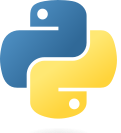Python (programming language)
 | |
| Paradigm | Multi-paradigm: object-oriented,[1] procedural (imperative), functional, structured, reflective |
|---|---|
| Designed by | Guido van Rossum |
| Developer | Python Software Foundation |
| First appeared | 20 February 1991[2] |
| Typing discipline | Duck, dynamic, strong typing;[3] gradual (since 3.5, but ignored in CPython)[4] |
| OS | Windows, macOS, Linux/UNIX, Android[5][6] and more[7] |
| License | Python Software Foundation License |
| Filename extensions | .py, .pyi, .pyc, .pyd, .pyw, .pyz (since 3.5),[8] .pyo (prior to 3.5)[9] |
| Website | python.org |
| |
Python is a high-level, general-purpose programming language. Its design philosophy emphasizes code readability with the use of significant indentation.[10]
Python is dynamically-typed and garbage-collected. It supports multiple programming paradigms, including structured (particularly procedural), object-oriented and functional programming. It is often described as a "batteries included" language due to its comprehensive standard library.[11][12]
Guido van Rossum began working on Python in the late 1980s as a successor to the ABC programming language and first released it in 1991 as Python 0.9.0.[13] Python 2.0 was released in 2000 and introduced new features such as list comprehensions, cycle-detecting garbage collection, reference counting, and Unicode support. Python 3.0, released in 2008, was a major revision not completely backward-compatible with earlier versions. Python 2.7.18, released in 2020, was the last release of Python 2.[14]
Python consistently ranks as one of the most popular programming languages.[15][16][17][18]
Installation
데비안 저장소에서 설치할 수 있습니다:
- sudo apt install python2
버전 3을 다음과 같이 설치할 수 있습니다:
- sudo apt install python3
현재 설치된 목록을 보기 위해,
- update-alternatives --list python
현재 2개의 버전이 설치되어 있고, 새로운 버전을 설치한 후에 선택적으로 버전을 변경하기 위해
- sudo update-alternatives --install /usr/bin/python python /usr/bin/python3.11 3
그런-다음 다음과 같이 선택할 수 있습니다:
- sudo update-alternatives --config python
See also
- Python syntax and semantics
- pip (package manager)
- List of programming languages
- History of programming languages
- Comparison of programming languages
References
- ^ "General Python FAQ — Python 3.9.2 documentation". docs.python.org. Archived from the original on 24 October 2012. Retrieved 2021-03-28.
- ^ "Python 0.9.1 part 01/21". alt.sources archives. Archived from the original on 11 August 2021. Retrieved 2021-08-11.
- ^ "Why is Python a dynamic language and also a strongly typed language – Python Wiki". wiki.python.org. Archived from the original on 14 March 2021. Retrieved 2021-01-27.
- ^ "PEP 483 – The Theory of Type Hints". Python.org. Archived from the original on 14 June 2020. Retrieved 14 June 2018.
- ^ "test — Regression tests package for Python — Python 3.7.13 documentation". docs.python.org. Retrieved 2022-05-17.
- ^ "platform — Access to underlying platform's identifying data — Python 3.10.4 documentation". docs.python.org. Retrieved 2022-05-17.
- ^ "Download Python". Python.org. Archived from the original on 8 August 2018. Retrieved 2021-05-24.
- ^ Holth, Moore (30 March 2014). "PEP 0441 – Improving Python ZIP Application Support". Archived from the original on 26 December 2018. Retrieved 12 November 2015.
- ^ File extension .pyo was removed in Python 3.5. See PEP 0488 Archived 1 June 2020 at the Wayback Machine
- ^ Kuhlman, Dave. "A Python Book: Beginning Python, Advanced Python, and Python Exercises". Section 1.1. Archived from the original (PDF) on 23 June 2012.
- ^ "About Python". Python Software Foundation. Archived from the original on 20 April 2012. Retrieved 24 April 2012., second section "Fans of Python use the phrase "batteries included" to describe the standard library, which covers everything from asynchronous processing to zip files."
- ^ "PEP 206 – Python Advanced Library". Python.org. Archived from the original on 5 May 2021. Retrieved 11 October 2021.
- ^ Rossum, Guido Van (2009-01-20). "The History of Python: A Brief Timeline of Python". The History of Python. Archived from the original on 5 June 2020. Retrieved 2021-03-05.
- ^ Peterson, Benjamin (20 April 2020). "Python Insider: Python 2.7.18, the last release of Python 2". Python Insider. Archived from the original on 26 April 2020. Retrieved 27 April 2020.
- ^ "Stack Overflow Developer Survey 2022". Stack Overflow. Retrieved 2022-08-12.
- ^ "The State of Developer Ecosystem in 2020 Infographic". JetBrains: Developer Tools for Professionals and Teams. Archived from the original on 1 March 2021. Retrieved 2021-03-05.
- ^ "TIOBE Index". TIOBE. Retrieved 3 January 2023.
The TIOBE Programming Community index is an indicator of the popularity of programming languages
Updated as required. - ^ "PYPL PopularitY of Programming Language index". pypl.github.io. Archived from the original on 14 March 2017. Retrieved 2021-03-26.
